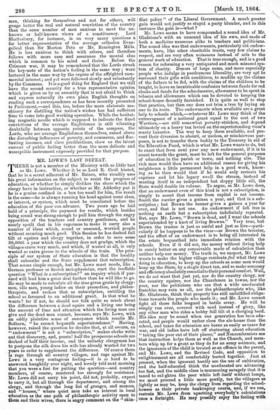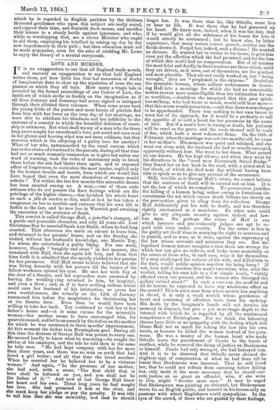MR. LOWE'S LAST DEFEAT. T HERE is not a member of
the Ministry with so little tact as Mr. Lowe. Whether it be as Lord R. Cecil hinted, that he is a secret adherent of Mr. Baines, who steadily uses his great information on the subject to resist the progress of education, or whether be simply dislikes the share which the clergy have in instruction, or whether as Mr. Adderley put it he is a genius confined in a box too small for him, the result is the same—he is always running his head against some class, or interest, or system, which must be conciliated before the education of the poor can advance. Two years ago he laid hold of a principle, the payment for results, which besides being sound was strong enough to pull him through the angry opposition of the teachers and country gentlemen, and he nearly spoilt that in his eagerness to make it carry also a number of ideas which, sound or unsound, worried people without securing much good. This Session he has dashed full tilt at squires and clergy together, in order to save some 30,0001. a year which the country does not grudge, which the villages crave very much, and which, if wasted at all, is only wasted as extra grease to the wheels of the train. The prin- ciple of our system of State education is that the locality shall subscribe and the State supplement that subscription. That seems simple enough, but Mr. Lowe must needs, like a German professor or Scotch metaphysician, start the ineffable question "What is a subscription?" an inquiry which if pur- sued will lead him a great deal farther than he will like to go. He may be made to calculate all the time given gratis by clergy- men, idle men, young ladies on their promotion, and philan- thropists, and reckon that as subscription, entitling the school so favoured to an additional grant. Is that what he wants? for if not, he should not talk quite so much about the difference between a dead squire and a living one being the amount of time and attention which the living man can give and the dead man cannot, because, says Mr. Lowe, with an oddly plaintive sense of annoyance which recalls Mr. Sothern, " he cannot bequeath superintendence." Having, however, raised the question he decides that, at all events, an " endowment " is not a "subscription," makes clerks write out that discovery, and, presto! half the prosperous schools are docked of half their income, and the unlucky clergyman has to postpone the silk dress his wife has already wanted for two years in order to supplement the difference. Of course there is rage through all country villages, and rage against Mr. Lowe is a very contagions feeling—it is so hard to be answered haughtily over night, and tersely told next morning that you were a fool for putting the question—and country members, of course, mustered too strongly for resistance. Mr. Lowe did not carry his point, did not, probably, expect to carry it, but all through the department, and among the clergy, and through the long list of granges, and manors, and " houses," where quiet men take an interest in local education as the one path of philanthropic activity open to them and their wives, there is angry comment on the "skin- flint policy " of the Liberal Government. A much greater gain would not justify so stupid a party blunder, and in this instance the gain is—what ?
Mr. Lowe seems to have compounded a sound idea of Mr. Gladstone's with an unsound idea of his own, and made of both a medicine nauseous alike to teachers and politicians. The sound idea was that endowments, particularly old endow- ments, have, like other charitable trusts, very few claims to respect, and are very often nuisances instead of aids to the general work of education. That is true enough, and is a good reason for reforming a very antiquated and much misused sys- tem of charity. Donors of large sums, and more especially people who indulge in posthumous liberality, are very apt to surround their gifts with conditions, to muddle up the claims.
of the fathers to be fed, with the claims of the children to be taught, to leave an inextricable confusion between funds for red cloaks and funds for the schoolmaster, allowances to be spent in.
tobacco and allowances which can be devoted to keeping the school-house decently furnished. It is quite as well to stop• that practice, but then one does not trim a tree by laying an axe to its roots. The endowments when available are a great help to schools which,—whatever Mr. Lowe may think of the extravagance of a national grant equal to the cost of two Warriors,—are still somewhat poverty-stricken, and depend ultimately on a heavy tax levied on the superintending vicar's scanty luxuries. The way to keep them available, and pre- vent their diversion to absurd, or useless, or mischievous pur- poses, is not to transfer them bodily to the Treasury in aid of the Education Fund, which is what Mr. Lowe wants to do, but to enact that from next year any new endowment, if it is to count towards the grant, must be left for the general purposes of education in the parish or town, and nothing else. The rich man would then have an additional reason for giving his neighbours a little permanent help in a good work, know- ing as he then would that if he would only restrain his caprices and let his legacy swell the stream, instead of wasting itself in an independent but sloppy little rill, the State would double its volume. To argue, as Mr. Lowe does,. that an endowment even of this kind is not a subscription, is simply to assert that income from capital is not income. Smith the currier gives a guinea a year, and that is a sub- scription ; but Brown the tanner gives a guinea a year for- ever, and that is not one. An endowment if left free is nothing on earth but a subscription indefinitely repeated. But, says Mr. Lowe, "Brown is dead, and I want the schools- superintended by a knot of living Browns." Very true, but Brown the trustee is just as useful and just as live—parti- cularly if he happens to be the vicar—as Brown the testator, and the effect of an endowment is to bring all interested in the estate bequeathed into immediate relation with the schools. Even if it did not, the money without living help is surely better on any conceivable mode of calculation than neither help nor money. The truth is, we suspect, Mr. Lowe wants to make the higher village residents feel what they are doing in education, to keep up the schools as some men would keep up the State, by a single direct tax, and so make economy and efficiency absolutely essential to their p ersonal comfurt. Well, we do not want that just yet, nor do the country clergy, nor the country squires, nor the Churchmen in towns, nor the poor, nor the politicians who see that a wide uneducated franchise may ruin us all, nor the philanthropists who, like Mr. Gladstone, think that property has still unfulfilled obliga- tions towards the people who made it; and Mr. Lowe cannot fight all those folks leagued in battle array. He will be simply run over, covered with mud instead of glory, like any other man who rides a hobby full tilt at a charging herd. His idea may be sound when one generation has been edu- cated, and people would rather close the ale-house than the school, and taxes for education are borne as easily as taxes for war, and old ladies have left off chattering about education " taking the poor out of their places," and Nonconformists see that instruction helps them as well as the Church, and mem- bers whip up for a grant as they do for an army estimate, and the ignorance of the child is treated as an offence in the parent, and Mr. Lowe, and the Revised Code, and opposition to enlightenment are all comfortably buried together. Just at present, when the ignorant hardly see the use of cultivation, and the half-educated think the uneducated are advancing too fast, and the middle class is murmuring savagely that it is taxed to enlighten the poor while left itself without lamps, we must proceed a little more gently, tax the villagers as lightly as may be, keep the clergy from regarding the school- houses as their private bankruptcy courts, and, if we can, restrain Mr. Lowe from upsetting everybody's calculations once a fortnight. He may possibly enjoy the feeling with
which he is regarded in English parishes by the thirteen thousand gentlemen who upon this subject are really sound, and expend their time, and diminish their means, and sacrifice their leisure to a sturdy battle against ignorance, and who, while so worshipping God, see a clever Minister who ought to aid them, employing his intellect in raising up day by day new impediments in their path ; but then education must not be made unpopular, even for the sake of enabling Mr. Lowe to enjoy the luxury of a mental currycomb.



































 Previous page
Previous page